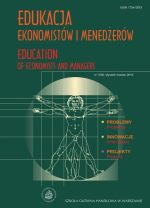Treść głównego artykułu
Abstrakt
This paper considers the widely approached problem of how individuals and groups make economic decisions. The author’s belief is that the answer to this question is highly interdisciplinary and lies not only in areas of study such as microeconomic theory and organisational behaviour, but also psychology, neuroscience and ethics. The author attempts to summarise a few chosen, existing models, which can help analyse both logical and psychological aspects of the process, and mentions a new, rising interdisciplinary field of neuroeconomics, which offers high potential for construction of new decision‐making models in the future.
Szczegóły artykułu
Autor (Autorzy) artykułu oświadcza, że przesłane opracowanie nie narusza praw autorskich osób trzecich. Wyraża zgodę na poddanie artykułu procedurze recenzji oraz dokonanie zmian redakcyjnych. Przenosi nieodpłatnie na Oficynę Wydawniczą SGH autorskie prawa majątkowe do utworu na polach eksploatacji wymienionych w art. 50 Ustawy z dnia 4 lutego 1994 r. o prawie autorskim i prawach pokrewnych – pod warunkiem, że praca została zaakceptowana do publikacji i opublikowana.
Oficyna Wydawnicza SGH posiada autorskie prawa majątkowe do wszystkich treści czasopisma. Zamieszczenie tekstu artykuły w repozytorium, na stronie domowej autora lub na innej stronie jest dozwolone o ile nie wiąże się z pozyskiwaniem korzyści majątkowych, a tekst wyposażony będzie w informacje źródłowe (w tym również tytuł, rok, numer i adres internetowy czasopisma).
Osoby zainteresowane komercyjnym wykorzystaniem zawartości czasopisma proszone są o kontakt z Redakcją.
![]()
Referencje
-
1. Crane, A., Matten, D. (2010). Business Ethics: Managing Corporate Citizenship and Sustainability in the Age of Globalization. Oxford: Oxford University Press.
2. Epley, N., Gilovich, T. (2005). The Anchoring‑and‑Adjustment Heuristic. Why the Adjustments Are Insufficient. New York: Cornell Education.
3. George, J.M., Jones G.R. (2008). Understanding and Managing Organizational Behavior. Boston, MA: Pearson Education.
4. http://geert‑hofstede.com/ITIM International. (2012). Retrieved 31 July 2015.
5. http://www.acrwebsite.org/volumes/v32/acr_vol32_62.pdf:
6. Nelson, L.D. (2005). Special Session Summary. Advances in the Investigation and Application of the Anchoring and Adjustment Heuristic, in NA – Advances in Consumer Research Volume 32, Eds. Geeta Menon and Akshay R. Rao, Duluth, MN: Association for Consumer Research, 125–128.
7. Janis, I.L. (1982). Groupthink. Boston: Houghton Mifflin.
8. Koontz, H., O’Donnell, C., Weihrich, H. (1986). Essentials of Management. New York: McGraw‑Hill.
9. Martin, J. (1993). Detroit’s Designing Women. Fortune, October 18, 10–11.
10. Rollinson, D. (2005). Organisational Behaviour and Analysis: An integrated approach. Harlow, Essex: Prentice Hall.
11. Sanfley, A.G. (2008). Social Decision Making Insights from Game Theory. Rockville Pike, Bethesda: PubMed.gov.
12. www.mindtools.com/Mind Tools: Online Management, Leadership and Career Training. Retrieved 31 August 2015.
13. www.mindtools.com/Mind Tools: Management Training and Leadership Training. Retrieved 31 August 2015.
Referencje
2. Epley, N., Gilovich, T. (2005). The Anchoring‑and‑Adjustment Heuristic. Why the Adjustments Are Insufficient. New York: Cornell Education.
3. George, J.M., Jones G.R. (2008). Understanding and Managing Organizational Behavior. Boston, MA: Pearson Education.
4. http://geert‑hofstede.com/ITIM International. (2012). Retrieved 31 July 2015.
5. http://www.acrwebsite.org/volumes/v32/acr_vol32_62.pdf:
6. Nelson, L.D. (2005). Special Session Summary. Advances in the Investigation and Application of the Anchoring and Adjustment Heuristic, in NA – Advances in Consumer Research Volume 32, Eds. Geeta Menon and Akshay R. Rao, Duluth, MN: Association for Consumer Research, 125–128.
7. Janis, I.L. (1982). Groupthink. Boston: Houghton Mifflin.
8. Koontz, H., O’Donnell, C., Weihrich, H. (1986). Essentials of Management. New York: McGraw‑Hill.
9. Martin, J. (1993). Detroit’s Designing Women. Fortune, October 18, 10–11.
10. Rollinson, D. (2005). Organisational Behaviour and Analysis: An integrated approach. Harlow, Essex: Prentice Hall.
11. Sanfley, A.G. (2008). Social Decision Making Insights from Game Theory. Rockville Pike, Bethesda: PubMed.gov.
12. www.mindtools.com/Mind Tools: Online Management, Leadership and Career Training. Retrieved 31 August 2015.
13. www.mindtools.com/Mind Tools: Management Training and Leadership Training. Retrieved 31 August 2015.
